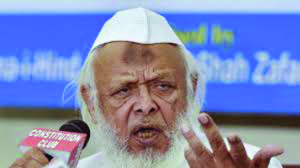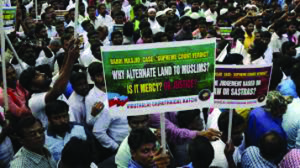NEW DELHI, DECEMBER 3
A prominent Muslim body, Jamiat Ulama-i-Hind, led by Maulana Syed Arshad Madani, on Monday filed a review petition in the Supreme Court against the top court’s verdict in the Babri Masjid-Ram Janmabhoomi title suit. All India Muslim Personal Law Board (AIMPLB) will also move the SC in this regard, said a press release.

In its verdict on November 9, the top court had awarded the land where the 16th century Babri Masjid once stood to the Hindu side for construction of Ram Temple and asked the government to give 5 acres land at some other place for construction of a mosque.
Soon after the verdict, while respecting the top court, the Muslim leadership had publicly expressed their dissatisfaction over the verdict and announced to file a review petition.
The title suit verdict was unanimously passed by a five-judge constitution bench headed by then Chief Justice Ranjan Gogoi. Other members of the bench were Justices S A Bobde (who is now Chief Justice), D Y Chandrachud, Ashok Bhushan and Abdul Nazeer.
The petition has been filed by Maulana Syed Asshad Rashidi, President, Jamiat Ulama-i-Hind, legal representative of M Sidddique, one of the original Muslim plaintiffs in the title suit.
The petition has been filed on the basis of three main points of the verdict:
* It is not proved that Babri Masjid was built after demolishing a temple
*Installation of idols in the mosque in 1949 was illegal
*Demolition of the mosque in 1992 was also illegal
The petitioner has asked that when these three points go in favour of the Muslim side, how the land of the mosque can be given to the Hindu side.
In the very beginning of the 217-page review petition, it is stated: “The review petitioner is conscious of the sensitive nature of the issue and understands the need to put a quietus to the issue in dispute so as to maintain peace and harmony in our country, however, it is submitted that there can be no peace without justice.”
The petition has pointed out some following “apparent errors” in the SC verdict:
*The relief allowing construction of temple in the disputed site amounts to a virtual mandamus to demolish the Babri Masjid.
* The acts committed in 1934, 1949 and 1992 against the mosque, which were denounced by the Court itself, have been rewarded.
* The principle that no person can derive benefit out of illegality has been disregarded while giving title to Hindu parties.
*The Court disregarded the principle that a tainted cause of action cannot be sustained or decreed in a civil suit.
* The Court did not appreciate that the structure had always been a mosque and had been in exclusive possession of Muslims.
* The rule of presumption under Section 114 of the Indian Evidence Act was disregarded on the question of use of mosque between 1528 and 1856.
* The Court erred in relying on travellers’ accounts and archaeological findings, despite noting that they are inconclusive.
In its November 17 Executive Committee meeting, Jamiat Ulama-i-Hind had decided to file the review petition against the verdict. It has also announced to reject the 5 acres land offer.
Earlier on the same day, All India Muslim Personal Law Board (AIMPLB), in its Lucknow meeting, passed resolution to file a review petition against the verdict. It had also rejected the land offer for mosque.
Meanwhile, the UP Sunni Central Wakf Board, one of the main parties to the Ayodhya title suit, has announced not to file any review petition in the case.

Meanwhile, terming the decision of All India Muslim Personal Law Board and the Jamiat-Ulema-e-Hind to seek a review of the recent Ayodhya verdict as “double standard”, spiritual leader Sri Sri Ravi Shankar said Hindus and Muslims should move on and work towards strengthening the economy.
The spiritual leader, who was part of the Supreme Court-appointed mediation panel in the Ayodhya case, said the matter would have been solved long back, had one side not been insistent on building a mosque at the disputed site.












